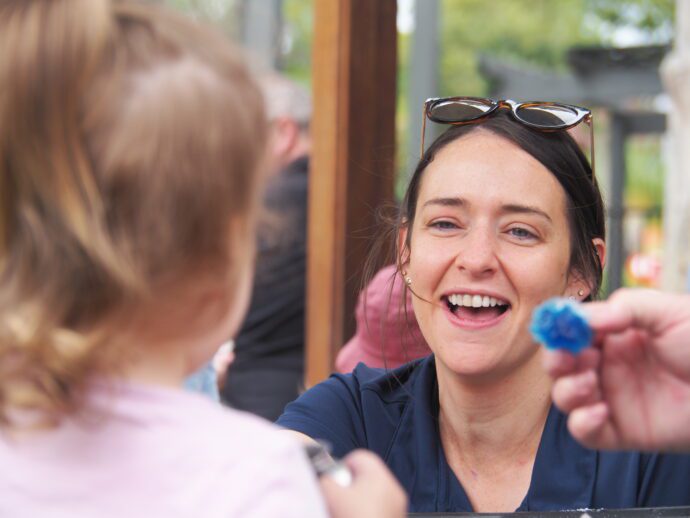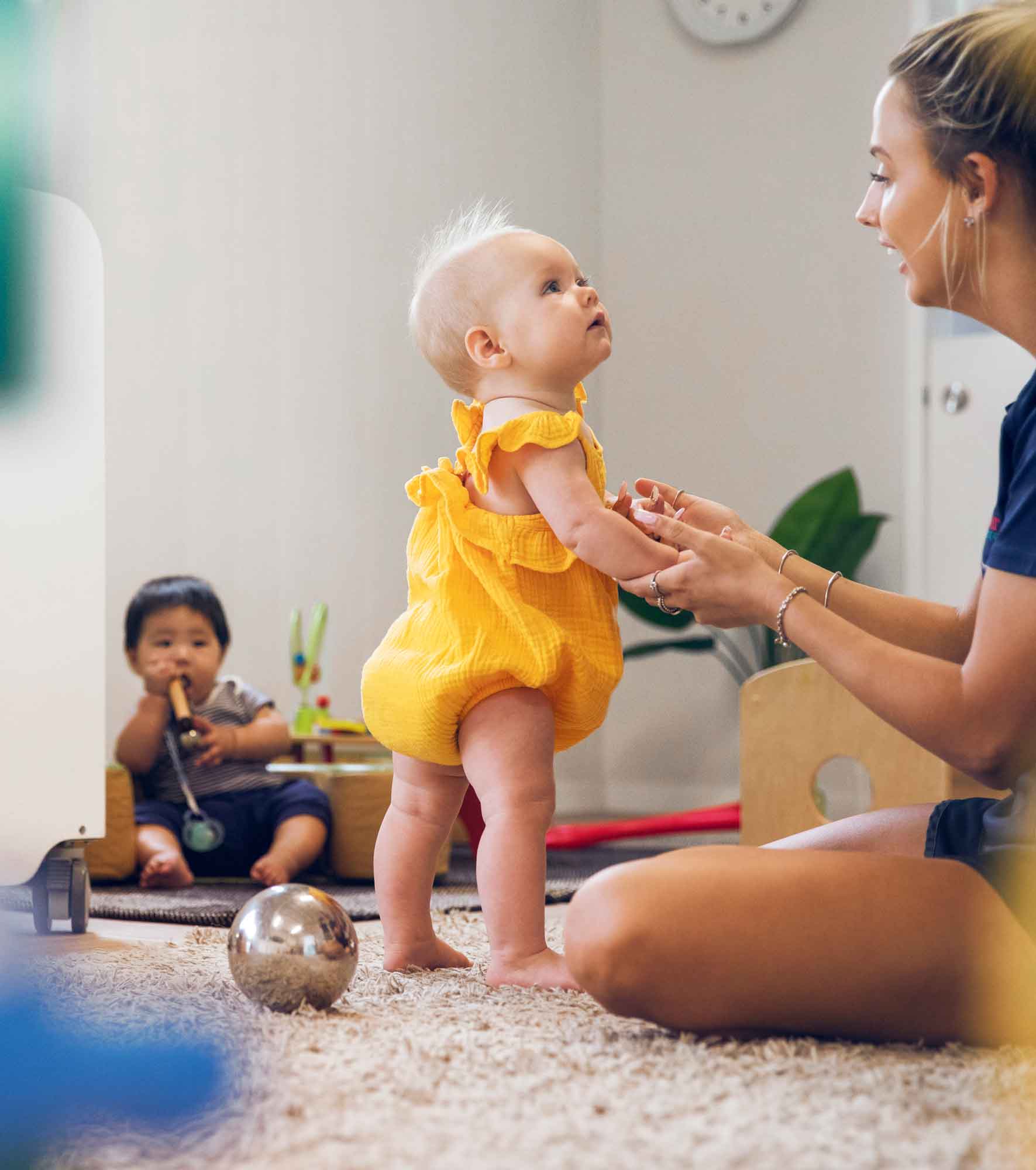The Big Benefit Of More Days In Childcare
“Two days were good – but five days are great for us”.

A report on one of our Journey families’ experiences
Just four months ago, Mia, two years old, started coming through Journey’s door five days a week instead of two. And seeing her, you can easily tell she’s happy and already excited.
There are no signs of separation anxiety; she doesn’t even wait for her father to say goodbye, but immediately gives her educator a happy hug.
She knows that breakfast is about to be served and the dinosaurs on the sensory tray table from yesterday are already waiting for her, and she most certainly is going to paint later because everyone here knows how much she likes doing that.
A big change: From two to five days a week
Just four months ago, Mia, two years old, started coming through Journey’s door five days a week instead of two. And seeing her, you can easily tell she’s happy and already excited.
There are no signs of separation anxiety; she doesn’t even wait for her father to say goodbye, but immediately gives her educator a happy hug.
She knows that breakfast is about to be served and the dinosaurs on the sensory tray table from yesterday are already waiting for her, And she most certainly is going to paint later because everyone here knows how much she likes doing that.
But it was not always like this. When she used to come here two days a week, she was one of the more reserved ones. Sometimes there were tears when she said goodbye in the morning, and she was more often in the second row during activities. But what has changed?
“We initially enrolled Mia for two days, Monday and Friday, because we thought it was important for her to have contact with her peers. And we thought she would gain social skills in this way.” Mia’s mother reports. “We had arranged it in that way, that I wanted to be there for her the remaining days myself.”
But then, a great job opportunity came up for the mother. It was a big decision for the little family. However, they changed their initial plans, and Mia came to visit us here at Journey every weekday from now on.
Initial worries and doubts
Of course, there were concerns on the parents’ side: How would Mia cope with the separation? How would the morning drop-off go? And would they still be able to spend enough time with their child? Mia’s parents expected everything – but the almost expected catastrophe? It simply did not happen.
Quite the opposite happened:
Mia virtually blossomed.
“We noticed it almost immediately. Even in the pictures we receive daily in StoryPark we see: She’s always in the middle of things now. There is no longer any trace of separation anxiety in the mornings, she is simply happy and has finally settled. Who would have thought that? In the beginning, we had so many concerns. But now she has even made her first friends. It’s wonderful to see and an enormous relief for me too.
Journey has become her second home.
She loves to come here, and every day when I pick her off, she has lots of stories to tell,” says Mia’s mother. Mia’s mother reports. “By the way, she talks a lot more now,” she adds and laughs.
Of course, she reports, she took much time at home with her daughter to inspire, encourage and teach her little wild curly head as much as possible. However, she could not keep up with the comprehensive curriculum offered here, she has to admit in retrospect.
As for Mia’s progress, our educators actually observe this more often when children come more days a week.
It may be difficult for children to have their routine disrupted just once or twice a week
This can result in separation anxiety and difficulty with drop-off.
Attendance at childcare for more days a week supports many children to get comfortable in the environment, particularly those who may feel anxious about separating from their families. As the environment becomes more familiar, children are able to settle more quickly and benefit from the many learning and developmental opportunities on offer.
The numerous benefits of daycare are well documented in studies.
We want to list just a few here:
- One of the great benefits of childcare is that children quickly become accustomed to a structured routine that helps them to learn a sense of belonging.
- Activities for toddlers in childcare are structured in such a way as to encourage their enjoyment and anticipation of regular activities such as story time or singing. This early introduction to structured activities helps them to make the transition to preschool and school much easier.
- Journey’s educators are trained to support and challenge every child to reach the next stage of development. Herewith they lay the foundations for the joy of learning that will accompany the children throughout their lives.
- This is then also reflected in details like these: Some studies show that teenagers who have attended childcare had higher cognitive abilities and academic results than those who did not. One, therefore, assumes that attendance at childcare boosts cognitive abilities.
- Another benefit of group time in early childhood is that children learn from an early age how to relate to others. The socialisation skills that they learn while having positive interactions with children in childcare will help to make them better communicators.
- Being in a safe, structured environment with children of their own age allows children to solve problems, learn to share, and work and play with others.
Increased self-confidence and the secure feeling of a second home
Since learning is best done through repetition, it is not surprising that more days on-site make children feel more confident, act more self-assured and really internalise their new learning. Like little Mia who has meanwhile discovered the climbing frame for herself. A new passion that has been awakened here.
No reason to feel guilty
Meanwhile, there is no need to have a bad conscience about giving the little ones too much into other hands. A further study suggests that even if you look after your child at home, in the end, you only spend a few hours more per week with your own child than if you choose daycare.
This was revealed by asking parents who cared for their children at home to note down what and how long they spent exclusively with their child during the day. And often the daily routine and the associated tasks demanded more time than they had expected.
The opposite is true for parents who place their child in care: The time you have together with your child during the day is usually devoted to it much more intensively and exclusively.
A positive result for all involved
“Here at Journey, I see that Mia is doing well and how lovingly she is cared for and, above all, promoted. I can then go to work with peace of mind and look forward to the time we spend together after pick up.” says Mia’s mother before she does just that. Both were looking forward to the reunion in equal measure. After a warm hug, Mia has lots to tell. And her mum has all the time in the world for her now. Another big benefit.
This is, of course only one example.
No matter which way your family chooses when it comes to the question of how many days in daycare are good for you and your child: Other studies also say that the basis for good learning is always a stable, loving relationship with the parents.
And having this, it doesn’t matter whether the day is spent at home or elsewhere.
More days would also be an option for your family? Just talk to your Centre Leadership Team today and find the perfect solution for you.

